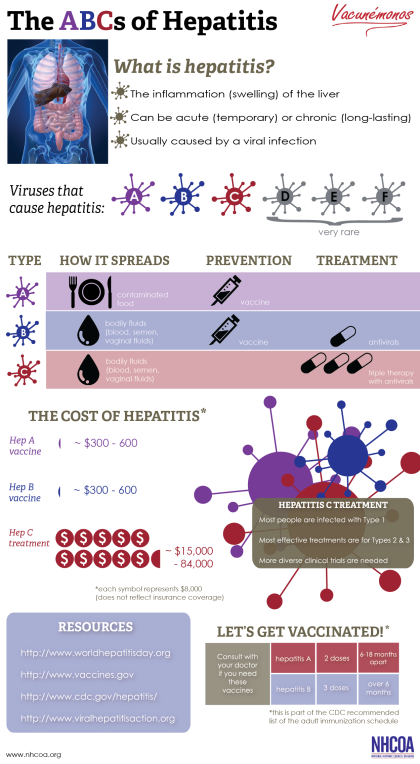World Hepatitis Day is one of four official disease-specific world health days
While viral hepatitis is the 8th leading cause of death in the world, it is a largely silent killer. Each year, the disease kills approximately 1.5 million people worldwide. In the United States, the CDC estimates 4.4 million people live with chronic hepatitis. However, most are unaware they are infected. Four years ago the World Health Organization designated July 28 as World Hepatitis Day to raise awareness and encourage action, especially among vulnerable and high-risk populations, including older Americans. Viral hepatitis is a life-threatening disease on its own, but often times it can be present along with other life-threatening infections, such as HIV.
[Learn the ABCs of hepatitis.]
Hepatitis, HIV & Older Americans
There are approximately 1.1 million people living with HIV/AIDS in the United States, of which nearly 20% were 55 years and older in 2010. People living with HIV/AIDS are disproportionately affected by viral hepatitis, including hepatitis B and C, which is also transmitted primarily through sexual contact and needle sharing. Due to the high risk of coinfection, it is recommend that people living with HIV get tested for viral hepatitis. The CDC also recommends getting vaccinated to prevent both hepatitis A and hepatitis B. While there is still no vaccine for hepatitis C, treatment is available and has improved greatly over the last several years. That is why it is more important than ever to know your hepatitis C status and to discuss treatment options with your healthcare provider if infected.
Because medical advances are allowing HIV patients to live longer and potentially healthier lives, the incidence of health conditions— often chronic, such as viral hepatitis— is higher among this population than their HIV-negative peers. In fact, research indicates that by next year, half of the people living with HIV in the United States will be 50 years or older.
[For more information on HIV and aging and important policy recommendations, read the Diverse Elders Coalition policy brief, Eight Policy Recommendations for Improving the Health and Wellness of Older Adults with HIV.]
When we shed light on infectious diseases such as HIV and viral hepatitis, we are sharing vital information that helps others make better and more informed decisions regarding their health. We are also helping bust myths and break down the shame and stigma that is often associated with these diseases. And, as our U.S. and global aging populations outnumber younger populations, it is key to include all older adults, including diverse seniors, in these conversations as their risk of infection likens that of other age groups.
How You Can Take Action
- Get the facts on viral hepatitis and have discussions with close friends and family.
- Participate in online conversations using the hashtag #ThinkHepatitis on Facebook and Twitter. You can also share the World Hepatitis Day Thunderclap message through your social media networks.
- Take the CDC assessment test and find out if you are at risk for hepatitis.
- Get tested for hepatitis A and B. If the results are negative, get vaccinated to prevent it.
- Get tested for hepatitis C and discuss treatment options with your healthcare provider if detected.
- Participate in a World Hepatitis Day event.
Additional Resources in Spanish
NHCOA Vacunémonos immunization brochure
Immunization Action Coalition fact sheet on Hepatitis A
Immunization Action Coalition fact sheet on Hepatitis B
NHCOA’s signature immunization program, Vacunémonos (Let’s Get Vaccinated) promotes awareness to increase Hispanic senior vaccination rates in a linguistically, culturally and age-appropriate manner.
Diana Moschos is the Senior Communications Associate for the National Hispanic Council on Aging (NHCOA). The opinions expressed in this article are those of the author and do not necessarily reflect those of the Diverse Elders Coalition.



